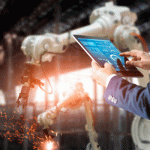IGNACIO CAROU
CEO, 2NV
Note taken from Computer World.
See on the website.
A new trend, known as RPA, automates manual and repetitive tasks that humans do in their work environments. As a result, organizations save costs, reduce the possibility of errors, while doing in minutes what previously took several hours.
For several years, robotization ceased to be a science fiction element to become a reality. The image of robots or machines that are in factories, assemble parts and replace defective parts with good ones, has been part of the innovation that has moved the main industries in recent times. But it was a matter of time before the robots entered the offices and also impacted the operational processes that companies carry out in their facilities and that, until now, occupy a large part of the time of employees.
A new range of robots, which manage to execute automatic processes controlled by algorithms, is here to stay. Its objective: to automate through software a number of manual and repetitive tasks that humans do in offices and that will allow organizations to save costs, reduce the possibility of errors and do in minutes what used to take several hours.
This is Robotic Process Automation, known as RPA, a new trend that is beginning to become an increasingly important part of digital transformation strategies for companies and that, naturally, was born in the most developed countries.
It is precisely in these countries where, according to the RPA Global study carried out by Deloitte, more than 53% of organizations -that is, one in two- have begun to use RPA to improve their efficiency and productivity. In countries like Colombia, more and more people are hearing about this trend. This is how companies in the financial sector, oil & gas, telecommunications, BPOs and integrators, already have it incorporated, or in the process of being absorbed, obtaining significant benefits.

What does it consist of?
According to Ignacio Carou, General Manager of 2NV, one of the companies specialized in this type of services in Colombia, Robotic Process Automation originates from the manual processing of high volumes of information in organizations.
In his concept, “companies must comply and execute more processes today than in the past to meet the needs of their business. Many of them lead to inefficiencies and high corporate risks if executed incorrectly. It is in this context where automation through bots (autonomous computer programs that are capable of carrying out specific tasks and imitating human behavior) become a great solution to reduce human intervention in repetitive processes, optimizing resources and reducing risks in operations. companies”.
Until now, one of the main applications of bots is to make areas such as Customer Service and Complaints and Claims Service in call centers more efficient. They are bots that, with the help of parameterization, or Artificial Intelligence and Machine Learning components, are ‘trained’ to give answers to customers, solving their doubts or indicating how they can access services.
Robotic Process Automation scales a new level within organizations. His focus now are repetitive tasks that have to do with technological, financial and accounting processes, among others. From migrating information from one app to another, or comparing competitor prices in an online store, to cutting down multiple steps in billing and payment processes, bots are taking over the tasks that humans once did.
During accounting and financial management, for example, it is common for a company’s employees to access different platforms and navigate through different menus to record daily entries, enter supplier invoices, manage approvals, and obtain information that they later consolidate in spreadsheets. for later consumption, either internally or through reports for control entities.
“These tasks are usually exhausting and are so time consuming that, hopefully, they are done only once a week. With the implementation of bots it is possible to achieve that the reports are made daily during the night (without overtime or nightly surcharges). As a result, each of the interested parties will have a copy in their mailbox at the beginning of the day and the information will always be obtained in the same way, avoiding biases that hinder making the right decisions. Likewise, during the training of new collaborators, greater emphasis will be placed on what to do with the information, instead of how to obtain it; At the same time, savings will be generated in costs, time and resources, by reducing human participation in the process. Finally, the possibilities of error will be reduced by reducing or eliminating possible human errors”, explains Ignacio Carou.
The 2NV executive adds that there are documented cases in which companies have managed to save thousands of dollars and reduce the execution of some of these processes related to the financial area from 240 to 20 hours.
Threat to current jobs?
Experts on the subject agree that automation is a trend that is here to stay. It cannot be seen as a passing fad. Therefore, rather than trying to stop it, the recommendation is that humans end up understanding it as an opportunity to develop new skills that make their work more interesting and differential.
At the moment, it is a trend that is barely taking off but already has significant growth projections. According to the Deloitte study, this market is expected to grow 72% worldwide between 2019 and 2020 and to become one of the most challenging trends for innovation and digital transformation of companies in the coming years.
“Many may see this as a threat. They will surely criticize the impact that it can generate in the labor market and the conflicts of competition between technology and humans. However, we believe that this situation has been taking place for many years as a result of technological advances that have had an impact on the employment options available. Just as new professions and activities emerge, others stop being productive and profitable. The implementation of this technology allows people to focus on more productive tasks with greater added value than the execution of repetitive and manual activities”, concludes Ignacio Carou, general manager of 2NV.






